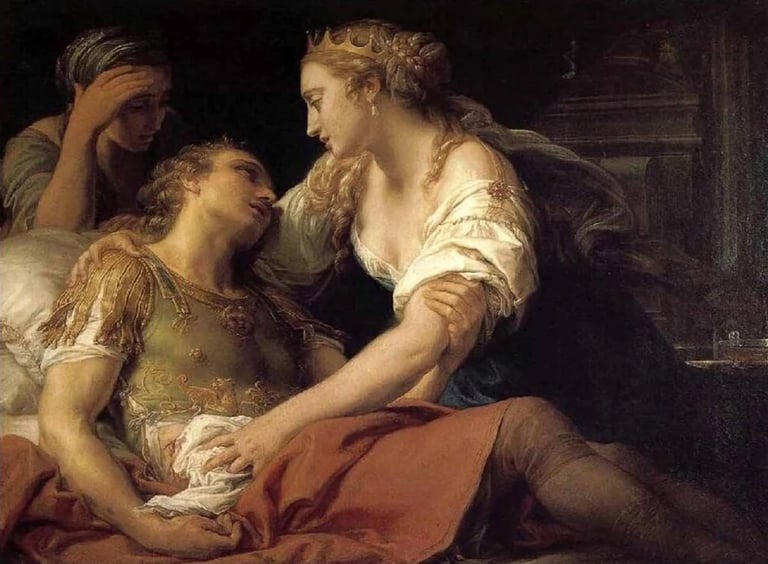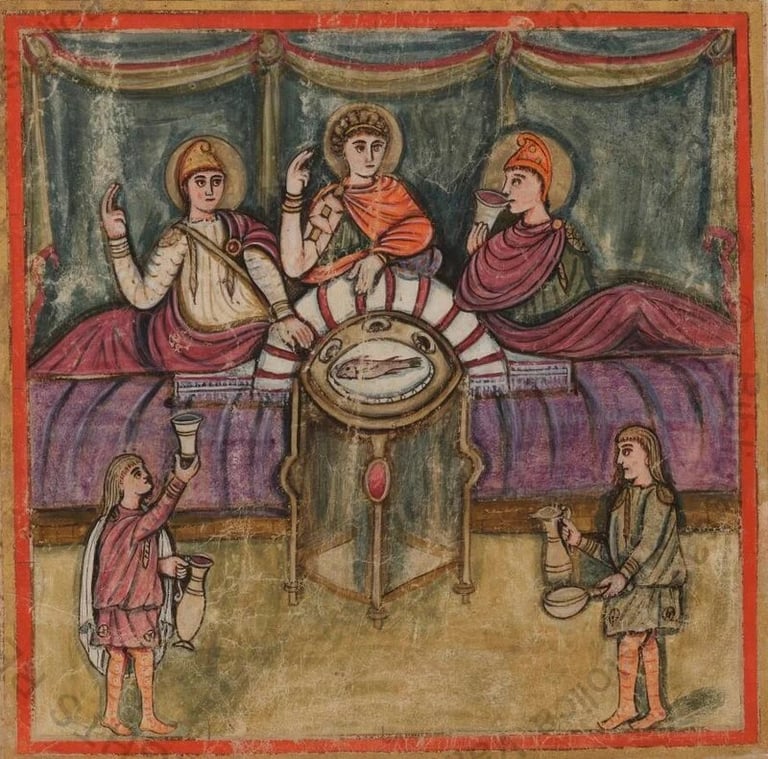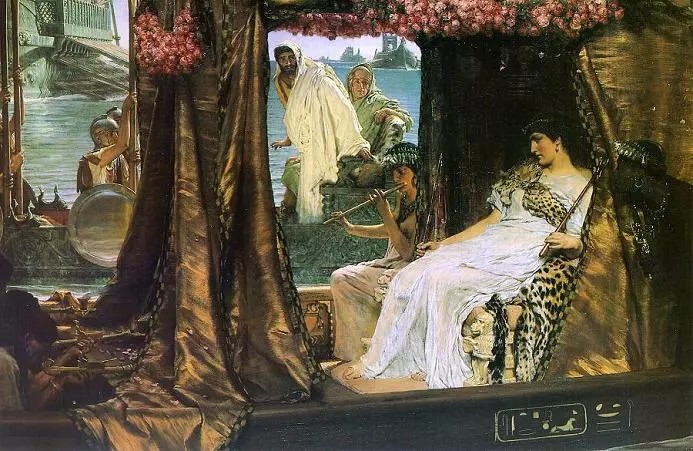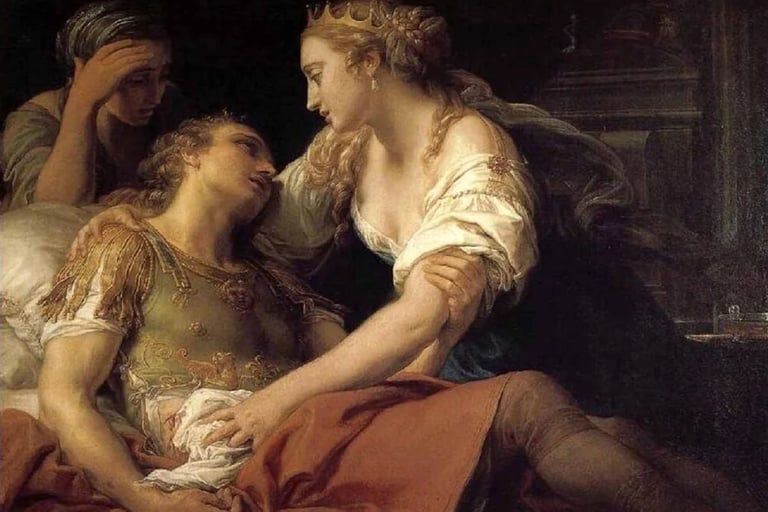JOHN FRAWLEY: ALL FOR LOVE
John Frawley's article: the astrological underpinning of Antony and Cleopatra


The Astrological Underpinning of Antony and Cleopatra
John Frawley's article
There is a good deal of astrological reference in Shakespeare’s plays. Most of this is empty of astrological significance. When we hear of those star-crossed lovers, for instance, we are not intended to wonder which stars had crossed them, nor did Shakespeare have any celestial configuration in mind. Some of it has a passing interest to us as astrologers, as when in the Comedy of Errors the diviner convinces Dromio of her abilities by telling him ‘what privy marks I had about me, as the mark of my shoulder, the mole in my neck, the great wart on my left arm’, just as William Lilly, not many years later, was claiming to do by looking at the chart. The soothsayer in Antony & Cleopatra gives a fine definition of our practice by saying:
«In Nature’s infinite book of secrecy
A little I can read.»
But Antony & Cleopatra also treats of astrology at a deeper level.
Amid the Elizabethan equivalent of a cast of thousands, there are three main characters. Marc Antony, the mighty – or once-mighty – warrior is likened to Mars from the opening lines of the play. Cleopatra is insistently, indeed almost tiresomely, likened to the Moon: to the Moon itself; to Isis, the lunar goddess; to the Nile, river that the Moon rules. Octavius is Caesar, earthly image of the Sun. If Mars-person and Sun-person come to the place ruled by the Moon, which of them will come out on top? A basic knowledge of astrology makes this a simple question; but in this we have the plot of the play, that which gives structure to what appears the least structured of all Shakespeare’s works, a rambling piece that defies successful production on any stage other than that between a reader’s ears. All else in that play is but illustration of the working out of this basic theme.
The place the Moon rules is Cancer. If Mars enters Cancer, what happens to it? It’s in its triplicity, so it likes being there: ‘Gimme more! Gimme more!’ But it’s in the sign of its fall. So when Antony – Mr Mars – enters the place that Cleopatra rules, Antony is in his fall. He is brought down. Shakespeare repeatedly shows us just that, in the most literal way. In the first scene, when Antony sends Rome to melt and vaunts his Cleopatran life-style, demanding that the world sees ‘we stand up peerless’, this is a joke, for he is too drunk to do so – as Cleopatra immediately observes. Nor can even his hot desire and Cleopatra’s eager charms bring him to stand in other ways, we are so often shown, such a sot he has become. That martial image is indeed undone. Ibn Ezra describes the sign of a planet’s fall as ‘the house of its dishonour’, an appropriate reading of Mars in Cancer here. Octavius, however – Mr Sun – can turn up in the house of the Moon with no ill effects at all.
Is this to say, then, that Shakespeare had astrology on his mind as he wrote? I doubt it. There is a structure to reality, a skeleton on which the cosmos is fleshed out. Dig deep enough and any artist will come upon that skeleton. No matter what the angle of approach, it is always the same skeleton, the same pattern, for this is the one and only one pattern upon which the cosmos is made. This is what makes the great artists great: they are the ones with the long spades and strong enough shoulders to dig to that depth that any human can recognise, across no matter how many generations. We see this structure in the scriptures; we see it in Homer, Virgil, Dante: those who have come close to the fount of truth. This same structure is what we study in astrology. That it is fashioned in this way and not that is why astrology works, and why astrology makes sense, in simple, logical terms. Because this is how Creation is made.
The theme here is a question that is fundamental to western literature, indeed to western culture: which side of the Mediterranean are you on? The good side or the fun side? The Mediterranean is in essence the same as the Red Sea: it is that which divides the path of destiny from the coils of the purely material life. It is in these coils that Antony becomes hopelessly and fatally entwined. The fleshpots of Egypt, full with cucumbers and garlic, had their temptations, especially as Israel wandered the desert. It was there, as Homer tells us, that Helen learned from Polydamna how to roll the jazz cigarettes. On the African shore was the land of the lotus-eaters, where those travellers who once taste of the lotus ‘forget the way home’. It was there where Dido tempted Aeneas to stay with her in dalliance. Nor is there suggestion that this was in any way a bad kind of dalliance: this was a very loving coil to tempt him from his path. But he was pious Aeneas, and would not be swayed from his destiny – albeit, as in the Punic Wars history took on the quality of myth, it was a long struggle for the city it was his God-given destiny to found not to fall under the Carthaginian sway.


The Feast of Dido and Aeneas. Miniature from the manuscript of Vergilius Romanus.
In astrological terms, this is the battle between the Sun and pretty much everything else. The only thing in the sky that keeps on the straight path is the Sun, following the ecliptic while the other planets wander up and down. Aeneas must keep on his straight path, and by so doing identifies himself as the solar hero, hence the city he must found having as its symbol the eagle, solar bird. The importance of founding Rome being that it is in Rome’s empire, during Octavius’s reign as Caesar Augustus, that God will become incarnate. Which is why Shakespeare finds the story of Antony and Cleopatra important. It isn’t only the matter of a soldier getting drunkenly love-struck and losing a battle: the whole of human history is in the balance here.


Antony and Cleopatra. Lawrence Alma-Tadema.
Antony – Mr Mars – has ambitions to be emperor himself. He is trying to be the solar hero, but he isn’t, he’s only Mars. Mars is incapable of keeping to the straight line, simply because it isn’t the Sun and only the Sun can do that. Antony must do battle with Octavius. Antony has a much bigger army with much better soldiers: he’s bound to win. But he’s ruled by the Moon, so he gives up this great advantage, agreeing with Cleopatra that they should fight on the water. At the height of battle, Cleopatra and her fleet suddenly flee. Antony, ‘like a doting mallard’ flies after her. All is lost. How could she do that? What else could she do, for she is the Moon, and when the Moon opposes the Sun it turns in its course and shrinks away.
Then Mr Sun arrives in Egypt, the house of the Moon. With eyes and feet both firmly fixed on that straight path, he does not fall under the power of Ms Moon. Instead, she is dominated by him. As Antony realises:
«Our terrene Moon
Is now eclipsed, and it portends alone
The fall of Antony.»
Hence the truth of this story, which is its immortal fascination: the characters are carved from that skeleton at the very depths of life, from the laws of the planets, which are the laws by which the cosmos runs. Mars will ever behave like Mars, the Moon like the Moon, the Sun like the Sun.
THE ARTICLE IS AVAILABLE IN RUSSIAN TRANSLATION HERE.
NOTE: All articles by John Frawley on our website are published and translated with his personal permission. The original article can be found on John Frawley's website, under the "Articles" section: «All for Love: The Astrological Underpinning of Antony and Cleopatra».
Subscribe to our blog



